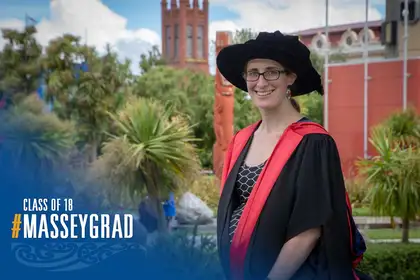
Dr Hayley Hunt.
When Hayley Hunt left Massey after completing her Bachelor of Veterinary Science, she thought she was done with study, but last week she graduated with a doctoral degree for her research into a debilitating muscle disease in dogs.
After working at a small animal veterinarian clinic in Whangarei for two years following the completion of her degree in the Bachelor of Veterinary Science, Dr Hunt received a scholarship to return to Massey to complete a residency and a Master of Veterinary Science in Veterinary Pathology.
“During my residency, I did a small amount of research and teaching and realised I enjoyed the challenges, rewards and flexibility offered by an academic career and to pursue this further a PhD would be required,” Dr Hunt says. “I initially took on a pathology-based project that one of my supervisors had devised, investigating muscle diseases in birds, but, after speaking to a vet in practice in Northland about an unusual muscle disease in dogs early in my PhD we undertook some preliminary investigations into this disease. We realised how poorly understood and under-recognised it was, and characterising this novel disease slowly expanded to become my entire research project.”
Dr Hunt investigated “go slow” myopathy, a muscle disease that interferes with energy production in muscle cells. It is seen mainly in dogs used for pig hunting and working farm dogs, but pet dogs can also be affected. Dogs affected by the disease usually have a sudden onset of trembling and collapse, followed by long periods of lethargy, with some never returning to full fitness.
“Pig hunters and dog owners had been seeing cases of this disease for 10-15 years prior to my research, but veterinarians were largely not aware of it and little had been done to investigate it. This meant I was starting on the back foot and initially many of the dog owners knew more about the disease than I did and were reluctant to seek veterinary attention for affected dogs. However, as the study progressed, I have been fortunate to receive significant support from them.”
Her findings suggest the muscle damage is due to a plant or fungal toxin eaten by the wild pigs, which the dogs are exposed to when they eat the pig meat.
“The disease is important from an animal welfare perspective, as affected dogs may not return to full fitness and also from a food safety perspective. The wild pigs eaten by dogs prior to developing the disease are also eaten by people and cooked meat can still make dogs sick. There’s no convincing evidence currently that people are affected by the disease, but this is an area of ongoing research.”
Dr Hunt has received funding to do metabolomic/toxicological studies on pig meat eaten by dogs that developed go slow myopathy in order to try and definitively identify the underlying cause of the disease.
On completing her PhD, Dr Hunt says she was lucky to have great supervisors and collaborators to see her through. “Although having a baby half way through a PhD probably didn't make it any easier to complete my PhD on time, but did provide great motivation and improved my focus.”